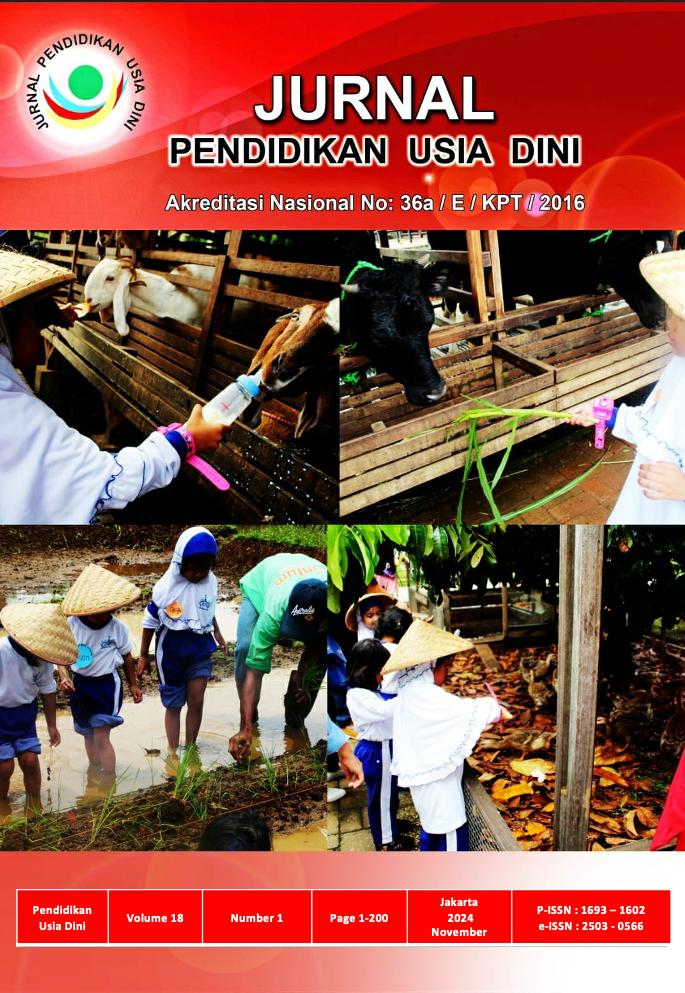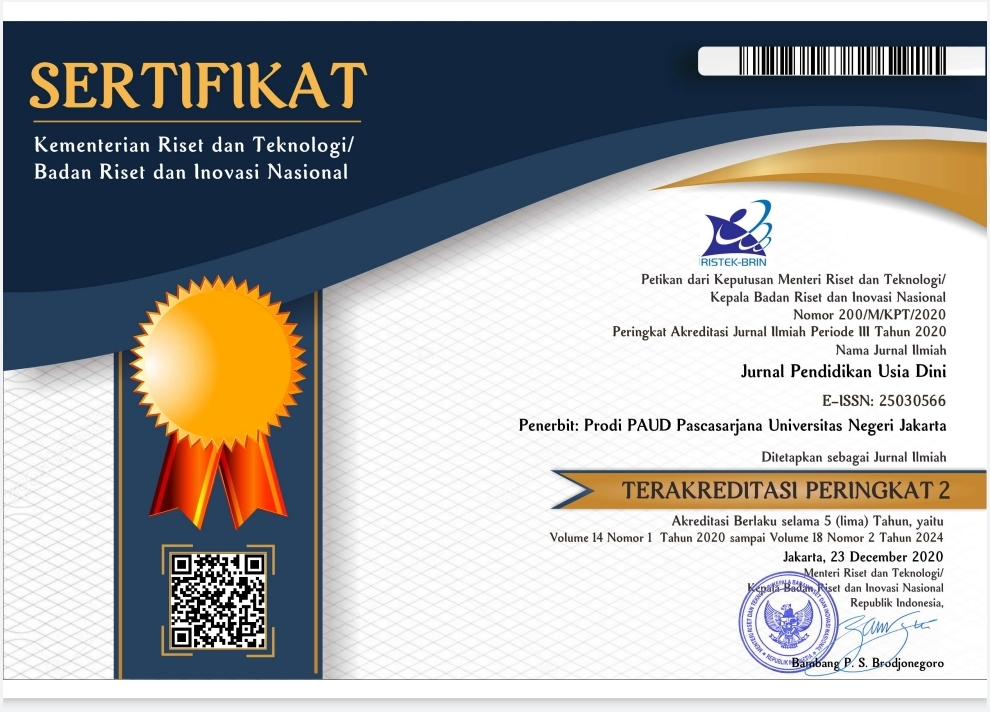The Relevance of the Curriculum Early Childhood Islamic Education Study Program to Employment Needs
DOI:
https://doi.org/10.21009/jpud.v18i2.48975Keywords:
Curriculum, Early Childhood Islamic Education Study Program, Employment NeedsAbstract
The workforce tests the skills students acquire during their studies. This study aims to analyze how the curriculum of the Early Childhood Islamic Education Study Program aligns with the competencies required in the workforce. In addition, this study evaluates the competitiveness of alumni and the level of satisfaction of the institutions that employ them. This study employs a mixed method, also known as a mixed method, along with a sequential explanatory design. Random sampling techniques selected a total of 45 alumni and 16 alumni users as samples. We collected quantitative data through surveys and obtained qualitative data through structured interviews and focus group discussions. We analyze quantitative data using descriptive statistics and interactively analyze qualitative data. The results showed that 97.78% of courses are relevant to work needs, and 98% of alumni competencies are in accordance with the demands of the workforce. However, the curriculum requires adjustments to face the challenges of the 21st century, such as technology integration, cooperative learning, application of differentiated learning, and a holistic learning approach. Additionally, the curriculum needs to adapt to current trends in early childhood Islamic education, including emotional management, smart device use, artificial intelligence, and STEAM-based learning design.
References
Ashsiddiqi, M. H. (2012). Teachers' Social Competence in Learning and Development. SHOW OF DIB, XVII(01), 61–67.
Aziz, A. (2017). Implementation of innovations in early childhood education models at the Serama Child Care Park (TPA) of the Ministry of Health of the Republic of Indonesia. JPUD - Journal of Early Childhood Education, 11(2), 201–214. https://doi.org/10.21009/jpud.112.01
Dudung, A. (2018). Professional Competence of Teachers. JKKP (Journal of Family Welfare and Education), 5(1), 9–19. https://doi.org/10.21009/jkkp.051.02
Furkan, N. (2013). Character Education Through School Culture (C. Nasirin & Khaerani (ed.); first). Magnum Pustaka Utama.
Hanafi, M. (2014). Curriculum Development of Islamic Religious Colleges. Islamuna: Journal of Islamic Studies, 1(2). https://doi.org/10.19105/islamuna.v1i2.572
Aaron, C. A. (2018). Learning United Kingdom for Early Childhood versus Local Culture. Early Horizons: Journal of Early Childhood Education, 5(2), 63–72. https://doi.org/10.17509/cd.v5i2.10499
Herlina, H., Bakar, I. P. S., Nurdiansyah, E., Hastati, S., & Marda, A. B. (2023). Implementation of the Teaching Campus Program in Strengthening Learning at SD Inpres Sugitangnga during the Covid 19 Pandemic. Barn of Innovation: Journal of Community Service, 8(1), 42–51. https://doi.org/10.36312/linov.v8i1.1001
Huda, M. (2018). Teacher Personality Competence and Student Learning Motivation (Correlation Study on Pie Subjects). Journal of Research, 11(2), 237–266. https://doi.org/10.21043/jupe.v11i2.3170
Indrawan, D., & Jalilah, S. R. (2021). Combination/Mixed Methods of Integration Forms in Research. Journal of Teacher Studies and Learning, 4(3), 735–739. https://doi.org/10.30605/jsgp.4.3.2021.1452
Jadama, L. M. (2014). Impact of Subject Matter Knowledge of a Teacher in Teaching and Learning Process. Middle Eastern & African Journal of Educational Research, 7, 20–29.
Jufni, M., Saputra, S., & Azwir. (2020). Teacher Code of Ethics in Improving the Quality of Muhammad's Education. Serambi Akademica: Journal of Education, Science, and Humanities, 8(4), 575–580. https://doi.org/10.56687/9781847421913-007
Kim, H. K. (2011). Developmentally Appropriate Practice (DAP) as Defined and Interpreted by Early Childhood Preservice Teachers: Beliefs About DAP and Influences of Teacher Education and Field Experience. SRATE Journal, 20(2).
Kim, J. Y., Choi, D. S., Sung, C. S., & Park, J. Y. (2018). The role of problem solving ability on innovative behavior and opportunity recognition in university students. Journal of Open Innovation: Technology, Market, and Complexity, 4(1), 1–13. https://doi.org/10.1186/s40852-018-0085-4
Landa, Z. R., Sunaryo, T., & Tampubolon, H. (2021). The Influence of Teachers' Digital Literacy and Learning Management on Students' Learning Interest at SMA Pelita Rantepao. Journal of Scholars: Journal of Mathematics Education, 5(1), 718–734. https://doi.org/10.31004/cendekia.v5i1.529
Lisdiyana. (2023). Teacher Personality Competencies in Early Childhood Character Formation. Al-Miskawaih: Journal of Science Education, 2(2), 1–9. https://doi.org/https://doi.org/10.56436/mijose.v2i1.274
Manora, H., Khasanah, N. L., & Akip, M. (2023). Independent Curriculum Management for Early Childhood Islamic Education. Bouseik: Journal of Early Childhood Islamic Education, 1(1), 1–15. https://doi.org/https://doi.org/10.37092/bouseik.v1i1.546
Mulyati, M. (2023). Trends and Development of Early Childhood Computational Thinking Skills in the 21st Century: A Theoretical Perspective. Journal of Obsession: Journal of Early Childhood Education, 7(4), 4155–4165. https://doi.org/10.31004/obsesi.v7i4.4005
Ningsih, Sri Yunimar, & Nurhafizah. (2019). The Concept of Pedagogic Competence in Improving the Professionalism of Early Childhood Education Teachers. Journal of Education Tambusai, 3(2), 694–703. https://doi.org/https://doi.org/10.31004/jptam.v3i2.270
Radinal, W. (2021). Competency Development of DI Educators in the Era of Disruption. An-Nur Journal, 1(1), 9–22.
Romansyah, R., Rahayu, S., Muchtar, H. S., & Sulastini, R. (2022). Higher Education Curriculum Management in the Industry 4.0 Era. Journal of Educational Vehicles, 9(1), 25. https://doi.org/10.25157/wa.v9i1.6866
Salman, I., & Widodo, A. (2020). Raudhatul Athfal Education Quality Improvement Policy in the 2015-2019 Ministry of Religion Strategic Plan Review. MODELING: Journal of PGMI Study Program, 7(2), 167–184. http://jurnal.stitnualhikmah.ac.id/index.php/modeling/article/view/664
Sanders, K., & Farago, F. (2018). Developmentally Appropriate Practice in the Twenty-First Century. In Springer International Handbooks of Education (hal. 1379–1400). https://doi.org/10.1007/978-94-024-0927-7_71
Wahyuni, I. W., Raihana, Utami, D. T., Lubis, A. N., & Anriani, E. (2021). Kecerdasan Emosi dan Kompetensi Sosial Guru. Aulad : Journal on Early Childhood, 4(3), 172–178. https://doi.org/10.31004/aulad.v4i3.105
Wahyuni, S., Khadijah, K., Budianti, Y., & Maisarah, M. (2021). Curriculum Development refers to KKNI in the PIAUD Study Program. Al-Athfaal: Scientific Journal of Early Childhood Education, 4(1), 14–30. https://doi.org/10.24042/ajipaud.v4i1.8334
Wakhanda, ellyta lufihasna. (2018). Management of Student Grouping in Improving the Quality of Education at Madrasah Ibtidaiyah (MI) Jetis Sukoharjo Thun Lesson 2017/2018.
Waruwu, M. (2023). Educational Research Approach: Qualitative Research Method, Quantitative Research Method and Mixed Method. Tambusai Education Journal , 7(1), 2896–2910.
Windarto, A. P., Parlina, I., & Wanto, A. (2019). PKM: Early Childhood Education Teachers " Literate " Technology in Simalungun Regency. Proceedings of the National Seminar on Entrepreneurship, 1(1), 337–343.
Yuliariatiningsih, M. S., & Setiaty, T. (2012). Pedagogic competence of early childhood education teachers in developing learning for early childhood. Early Horizons - Journal of Early Childhood Education, 3(1), 1–18. https://ejournal.upi.edu/index.php/cakrawaladini/article/view/10325/6363
Yulmasita Bagou, D., & Suking, A. (2020). Analisis Kompetensi Profesional Guru. Jambura Journal of Educational Management, 1(September), 122–130. https://doi.org/10.37411/jjem.v1i2.522
Yusri, N. (2021). Early Childhood Learning Strategies for the 21st Century. Adzkiya ISSN Journal, 5(1), 54–72.
Downloads
Published
How to Cite
Issue
Section
License
Copyright (c) 2024 https://creativecommons.org/licenses/by/4.0/

This work is licensed under a Creative Commons Attribution 4.0 International License.
JURNAL PENDIDIKAN USIA DINI work is licensed under a Creative Commons Attribution 4.0 International License. (http://creativecommons.org/licenses/by/4.0/)





